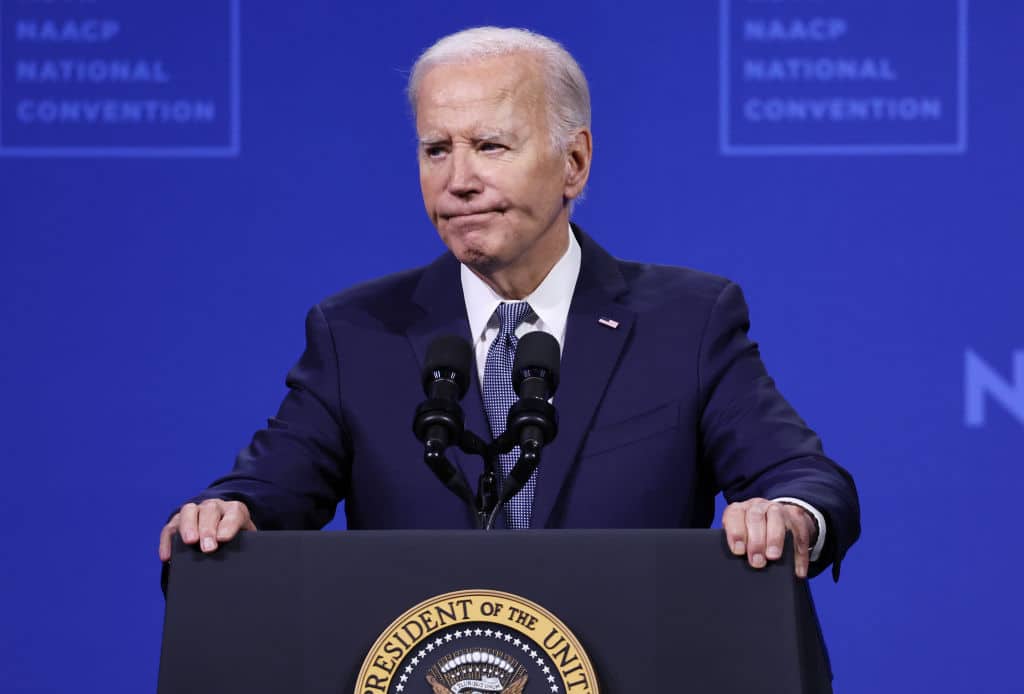TOPLINE
President Joe Biden announced Sunday he will end his 2024 presidential campaign, saying he believes “it is in the best interest of my party and the country to stand down.”
KEY FACTS
Biden stepped down after more than three dozen Democrats in Congress urged him to do so, and after a flurry of reports that Democratic leaders in Congress were working behind the scenes to push Biden to end his bid.
Biden has faced questions for months about whether he is too old to serve another term, but the party largely stood behind him until his disastrous June 27 debate performance, when Biden often appeared bewildered, gave disjointed answers and spoke in a soft, raspy voice—leading to an onslaught of backlash from pundits, major newspapers, celebrities, donors and elected Democrats.
Biden’s decision to leave the race at this stage in the election cycle is unprecedented in modern politics and sets up a mad dash to choose his replacement, just weeks before the party is set to formally choose its nominee in a virtual roll call the first week of August.
WHEN WILL A NEW NOMINEE BE CHOSEN?
Democrats plan to hold a virtual roll call to formally select their nominee as soon as Aug. 1 and before Aug. 7, ahead of the party’s Aug. 19 convention. The party initially planned the early roll call to ensure Biden would be on the ballot in Ohio, which previously required nominees to be confirmed 90 days before the election. Ohio has since revised its law, but it doesn’t take effect until Sept. 1, so Democrats have said they will move forward with the early nomination anyway.
Loading...
HOW WILL DEMOCRATS REPLACE BIDEN?
The approximately 4,700 Democratic delegates will choose a new candidate by majority vote. About 4,000 delegates are “pledged” to Biden, but by stepping down, he effectively releases them from their obligation to vote for him. The 700 “unpledged” delegates—also known as superdelegates and can vote for whoever they please—are allowed to vote in a second round if a candidate does not secure the majority votes needed to win in the first round.
WHAT IS AN OPEN CONVENTION?
An open convention would occur if multiple candidates are presented to delegates at the convention, and Biden hasn’t endorsed a replacement, leaving his delegates free to vote for anyone.
WHAT IS A ‘MINI-PRIMARY’?
The process of choosing a new nominee isn’t exactly clear, but some have floated a “mini primary” involving a series of campaign events—such as debates, high-profile interviews or town halls—between potential Biden replacements prior to delegates casting their votes. Rep. James Clyburn, D-S.C., has said he would support Harris as the nominee if Biden dropped out and the party coalesced around her, but he has also suggested Democrats could conduct a “mini primary” to survey other candidates, an idea New York Times columnist Ezra Klein and longtime Democratic political consultant James Carville also endorsed.
WHO ARE THE TOP CONTENDERS TO REPLACE BIDEN?
Harris is the top contender, but other names commonly floated include California Gov. Gavin Newsom, Illinois Gov. J.B. Pritzker, Michigan Gov. Gretchen Whitmer, Colorado Gov. Jared Polis, and Pennsylvania Gov. Josh Shapiro. Previous Democratic presidential candidates Transportation Secretary Pete Buttigieg and Sens. Cory Booker, D-N.J., and Amy Klobuchar, D-Minn., are also among the potential contenders. No Democrats who have been seriously floated as potential replacements have said they’re interested in the 2024 nomination.
HOW IS KAMALA HARRIS POLLING?
Similar to Biden and slightly better than all other potential replacements surveyed, but still worse than Trump, according to most surveys. A mid-July YouGov poll (margin of error 3.1) found Biden would lose to Trump by two points and Harris would lose by three, while a Reuters/Ipsos poll found both Biden and Harris are virtually statistically tied with Trump. In a CNN/SSRS poll (margin of error 3.5) conducted days after the debate, Harris outperformed Biden, and three other potential candidates commonly floated to replace him, in a hypothetical matchup against Trump—but she would still lose to the former president by two points (while Biden would lose to Trump by six points).
WHAT DO SUPPORTERS—AND CRITICS—SAY ABOUT HARRIS?
Several prominent Democrats explicitly mentioned Harris as the most viable option to replace Biden prior to him announcing his resignation from the race. Clyburn has said he believes Harris would do “very well” at the top of the ticket and the party should do everything it can to “bolster” her would-be candidacy. Harris has downsides, however, including a relatively low approval rating (though it’s likely a direct reflection of Biden’s own low approval rating) and a series of negative stories about her job performance as vice president, including that she’s been largely absent from the public eye. Her record as a state and local prosecutor has also drawn ire from some progressives who have accused her of not doing enough to investigate police misconduct and have pointed out her history of prosecuting marijuana-related offenses. Harris’ views on criminal justice seem to have evolved however, as she’s endorsed Biden’s pardoning of federal marijuana-related convictions and she has spoken out against the notion that putting more police in the streets increases public safety. Former Rep. Tim Ryan, D-Ohio, slammed Harris’ detractors in endorsing her to replace Biden in a recent Newsweek op-ed, calling her “a joy to hang out with . . . brilliant, compassionate, engaging, funny and totally down to earth.” Harris, he said, “can energize the electorate and govern effectively.”
This is a developing story. Check back for updates.
Loading...
